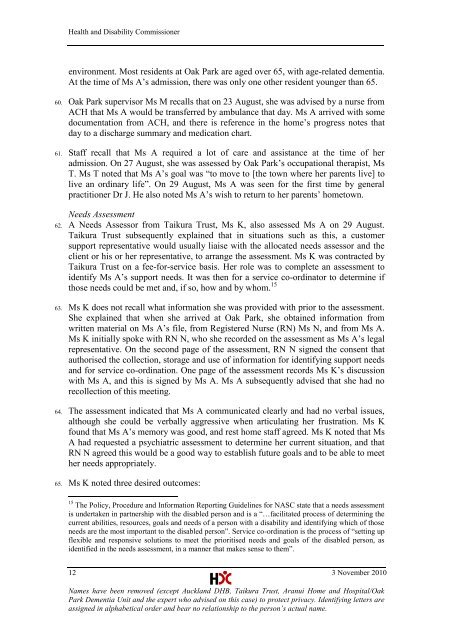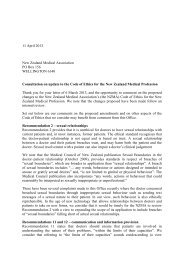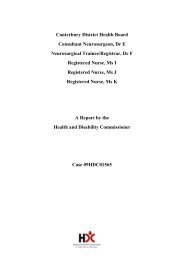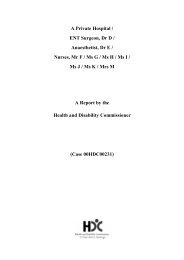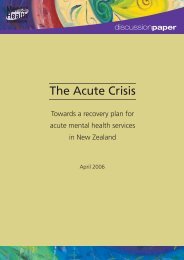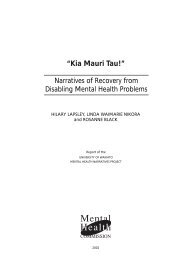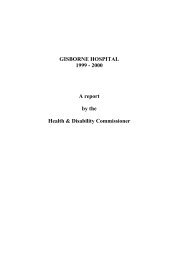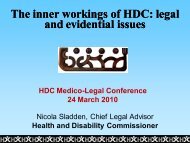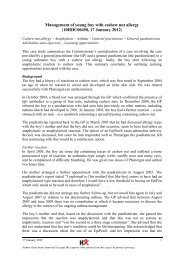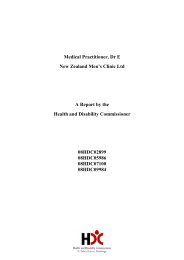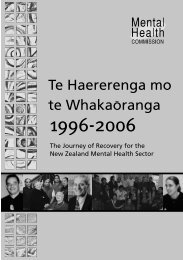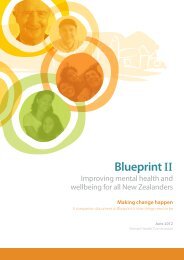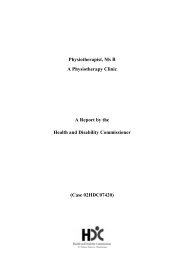Auckland District Health Board Taikura Trust Aranui Home and ...
Auckland District Health Board Taikura Trust Aranui Home and ...
Auckland District Health Board Taikura Trust Aranui Home and ...
Create successful ePaper yourself
Turn your PDF publications into a flip-book with our unique Google optimized e-Paper software.
<strong>Health</strong> <strong>and</strong> Disability Commissioner<br />
environment. Most residents at Oak Park are aged over 65, with age-related dementia.<br />
At the time of Ms A’s admission, there was only one other resident younger than 65.<br />
60. Oak Park supervisor Ms M recalls that on 23 August, she was advised by a nurse from<br />
ACH that Ms A would be transferred by ambulance that day. Ms A arrived with some<br />
documentation from ACH, <strong>and</strong> there is reference in the home’s progress notes that<br />
day to a discharge summary <strong>and</strong> medication chart.<br />
61. Staff recall that Ms A required a lot of care <strong>and</strong> assistance at the time of her<br />
admission. On 27 August, she was assessed by Oak Park’s occupational therapist, Ms<br />
T. Ms T noted that Ms A’s goal was ―to move to [the town where her parents live] to<br />
live an ordinary life‖. On 29 August, Ms A was seen for the first time by general<br />
practitioner Dr J. He also noted Ms A’s wish to return to her parents’ hometown.<br />
Needs Assessment<br />
62. A Needs Assessor from <strong>Taikura</strong> <strong>Trust</strong>, Ms K, also assessed Ms A on 29 August.<br />
<strong>Taikura</strong> <strong>Trust</strong> subsequently explained that in situations such as this, a customer<br />
support representative would usually liaise with the allocated needs assessor <strong>and</strong> the<br />
client or his or her representative, to arrange the assessment. Ms K was contracted by<br />
<strong>Taikura</strong> <strong>Trust</strong> on a fee-for-service basis. Her role was to complete an assessment to<br />
identify Ms A’s support needs. It was then for a service co-ordinator to determine if<br />
those needs could be met <strong>and</strong>, if so, how <strong>and</strong> by whom. 15<br />
63. Ms K does not recall what information she was provided with prior to the assessment.<br />
She explained that when she arrived at Oak Park, she obtained information from<br />
written material on Ms A’s file, from Registered Nurse (RN) Ms N, <strong>and</strong> from Ms A.<br />
Ms K initially spoke with RN N, who she recorded on the assessment as Ms A’s legal<br />
representative. On the second page of the assessment, RN N signed the consent that<br />
authorised the collection, storage <strong>and</strong> use of information for identifying support needs<br />
<strong>and</strong> for service co-ordination. One page of the assessment records Ms K’s discussion<br />
with Ms A, <strong>and</strong> this is signed by Ms A. Ms A subsequently advised that she had no<br />
recollection of this meeting.<br />
64. The assessment indicated that Ms A communicated clearly <strong>and</strong> had no verbal issues,<br />
although she could be verbally aggressive when articulating her frustration. Ms K<br />
found that Ms A’s memory was good, <strong>and</strong> rest home staff agreed. Ms K noted that Ms<br />
A had requested a psychiatric assessment to determine her current situation, <strong>and</strong> that<br />
RN N agreed this would be a good way to establish future goals <strong>and</strong> to be able to meet<br />
her needs appropriately.<br />
65. Ms K noted three desired outcomes:<br />
15 The Policy, Procedure <strong>and</strong> Information Reporting Guidelines for NASC state that a needs assessment<br />
is undertaken in partnership with the disabled person <strong>and</strong> is a ―…facilitated process of determining the<br />
current abilities, resources, goals <strong>and</strong> needs of a person with a disability <strong>and</strong> identifying which of those<br />
needs are the most important to the disabled person‖. Service co-ordination is the process of ―setting up<br />
flexible <strong>and</strong> responsive solutions to meet the prioritised needs <strong>and</strong> goals of the disabled person, as<br />
identified in the needs assessment, in a manner that makes sense to them‖.<br />
12 3 November 2010<br />
Names have been removed (except <strong>Auckl<strong>and</strong></strong> DHB, <strong>Taikura</strong> <strong>Trust</strong>, <strong>Aranui</strong> <strong>Home</strong> <strong>and</strong> Hospital/Oak<br />
Park Dementia Unit <strong>and</strong> the expert who advised on this case) to protect privacy. Identifying letters are<br />
assigned in alphabetical order <strong>and</strong> bear no relationship to the person’s actual name.


